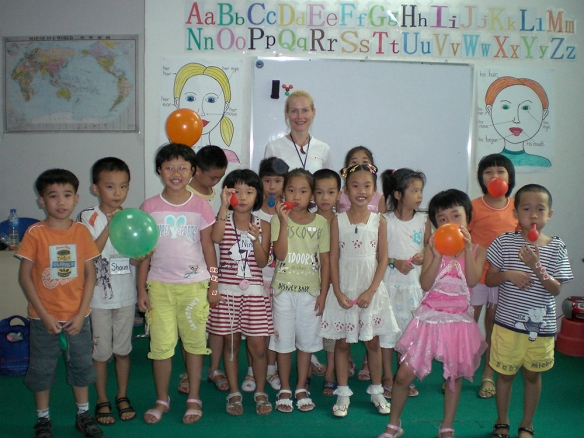Foshan is a city of contrasts. Crumbling brick hutongs hide behind pollution-stained high-rise buildings; teashops on every street offer free tastings—there’s jasmine, pu’er, gunpowder, oolong, white tea, tight little dried rosebuds for infusions and more; fresh produce markets bursting with vibrant colour and pungent aromas are crammed into tight spaces throughout the CBD; motorcycle butchers speed down the streets with pigs—sliced in half from snout to curly tail—slung over the back racks; and on street corners mobile fruit vendors display their produce on the backs of adult-sized tricycles. They sell sweet sweet peaches, lychees, rambutans, watermelons and dragon fruit in the summer and barbecue pork buns, steamed corn and roasted chestnuts and yams in the winter.
***
In the autumn I am allocated new conversational English classes—Children’s Beginners aged 6-8. I must maintain their attention for two hours and so abandon the traditional-teacher mode in exchange for a dramatic persona and English-focused games. The goal is for the students to speak eighty per cent of the time and limit teacher talk time to twenty per cent. I have a teaching bag full of flashcards, coloured magnets, two balls, music CDs, balloons, hand puppets, a ‘sticky ball’ that when thrown sticks to the white board, and numerous whiteboard markers. In class I mime, act, play the clown, sing and dance my way through the teaching materials—it’s playschool on steroids. The kids love it. They race up to greet me and I walk the last few metres to class with children clinging to my legs, arms and hands. An excited rabble, they rush me into the room.
***
At the supermarket an old woman rummages through the contents of my basket, inspecting my baguette, noodles, soymilk and other purchases. I stare open-mouthed at her, too shocked to say anything.
***
Ash and I are learning Putonghua (Mandarin), the official language of China, even though we live in Guangdong, the old Canton, where many people speak only Cantonese. I can count to one hundred, buy bus and train tickets, order dumplings and noodles in a restaurant and introduce myself.
***
The pollution cuts the horizon in half, pushes down and envelopes the city. At the end of the street Bia Hua TV Tower is reduced to a shadow of its former self. The sun and blue skies are a distant memory.
***
One day Sinny, my teaching assistant, invites me out for lunch. We go to a noodle house that I’ve nicknamed the Three Kuai Place, because that’s how much most dishes cost. Sinny orders chicken and it arrives chopped into bite-sized chunks. Bones included. I still can’t eat chicken on the bone using just chopsticks. Sinny deftly pops a piece into her mouth, swishes her cheeks as though rinsing with mouthwash, then extracts a clean piece of bone and places it on the table. Behind her a man in a suit is doing the same, only he spits his bones directly onto the table.
‘How do you do it?’ I ask.
‘Just use your tongue to help suck the meat off the bone,’ she replies.
I try but can’t get my tongue to wiggle the meat loose and, on reflex, chew, mashing meat and bone together. My face flames red as I spit the mess into a tissue.
‘Ai ya, I wish there was chicken without bones,’ I complain.
‘Westerners have lazy mouths, that’s all,’ Sinny shoots back with a grin.
***
December arrives and with it hints of Christmas emerge as stores put up festive decorations, tinsel streamers and Christmas trees. Christmas carols, sung in Chinese, are piped through supermarket speakers.
Helen calls a staff meeting. Lingdong will host a school Christmas party, she announces. There will even be a turkey. Adult students will be encouraged to buy tickets to the party, the selling point being to experience a true Western Christmas. We, the teachers, must provide some form of entertainment for the paying guests.
‘You’ve gotta be kidding, Helen! I’m a teacher not a performing monkey,’ bellows Kinga.
The room is a rumble of discontent.
Helen asks us to define entertainment at a Western Christmas party. ‘Basically, it comes down to three things: food, alcohol—lots of alcohol—and music,’ explains Kinga.
‘That’s it?’ she asks.
‘Yes!’ the ten of us chorus.
‘Helen, our Christmas parties are very simple. We eat, we drink, we dance, we drink some more, talk to people, drink and dance even more, and then keep drinking,’ offers Ash.
‘Chinese people would not enjoy such a party,’ frowns Helen. ‘They need guided entertainment. They need to have an activity to be involved in, to be told what to do next.’
And that’s how we find ourselves poolside, with a stage, Christmas tree and fake snow machine in the middle of winter. The glistening pool stirs up memories of golden beaches and sunshine; I haven’t seen either for five months.
‘Next,’ announces Forest, Helen’s second in command, ‘is the candy relay race. Rules of the game are: the first runner dips a spoon into the bucket of candy, takes just one piece, races back to the team and passes the spoon to the next person. The team with the most candy is the winner.’
I move in closer to watch. I’ve played this game with my younger students and while they love it, they are unable to show restraint; cheating abounds.
Forest blows her whistle, ‘Go!’
In under a minute the adults resort to stealing candy, tripping up competitors, pocketing candy and, yes, trying to steal the candy bucket for their team. Forest screeches into the microphone in an attempt to get everyone to play in an orderly fashion. It’s too late for that. The stilted, stiff Chinese guests are laughing and having fun.


“Westerners have lazy mouths…” Ha! Ha! (but true!)
LikeLiked by 1 person
And that is how we party 😉
LikeLiked by 2 people